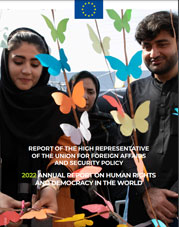
EU Report 2022: Efforts Needed to Strengthen the Independence of Judicial and State Institutions in Georgia
By Liza Mchedlidze
Thursday, August 3, 2023
According to the 2022 report on the state of human rights and democracy in the world, published by the European Union, further efforts are required to address certain challenges, particularly in the areas of judicial reforms, anti-corruption measures, and the strengthening of the independence of state institutions in Georgia.
The report indicates that the human rights situation in the breakaway regions of Abkhazia and South Ossetia remains concerning, highlighting the need for attention to the issues in those regions. While Georgia has made some advancements in human rights and democracy, there is still work to be done to fully meet the standards required for EU membership and ensure the protection of human rights across the country.
"Overview of the human rights and democracy situation: Georgia applied for membership in the European Union in March 2022. The European Council recognised the European perspective of Georgia in June 2022 and stated its readiness to grant the status of candidate country once the priorities specified in the Commission's Opinion on Georgia's membership application have been addressed. These priorities include issues related to the strengthening of democratic principles, the rule of law and human rights obligations. 39 Overall Georgia has a solid human rights framework, including legislations and policies in line with international and European standards. However, implementation should be strengthened in several areas. In 2022, progress has been achieved in the reforms of the electoral system, of the public administration, the enhancement of gender equality, the rights of the child, and the rights of persons with disabilities. Further efforts are still needed in the area of judicial reforms, anti-corruption, strengthening the independence of State institutions. The human rights situation in the Georgian breakaway regions of Abkhazia and South Ossetia remains concerning," the report reads.
According to Mikheil Sarjveladze, Chairman of the Human Rights Protection Committee of the Georgian Parliament, the European Union's report on Georgia is positive. Sarjveladze stated that the country has made remarkable progress in terms of human rights protection, and it continues to move forward.
According to Sarjveladze, the government is carrying out reforms that have not gone unnoticed by the European Union.
"The report of the European Union is positive. In 2012, Georgia had a difficult legacy in terms of human rights protection; it was the worst situation, known not only to the local community but also to the whole world. However, Georgia has made remarkable progress in this regard and continues to advance. The government's efforts in implementing reforms have been acknowledged by the European Union. The appreciation is appropriate and positive, signifying that the country now has a robust system in place for protecting human rights. This demonstrates Georgia's significant progress in building institutional democracy, including the protection of human rights."
Sarjveladze emphasized that although Georgia has achieved much, it doesn't mean they can rest satisfied without a vision for further strengthening those achievements.
"While focusing on anti-corruption measures, we must remember that Georgia is one of the model states with its own indicators, surpassing many EU states due to its sustainable system. I wouldn't call it a mere note in this aspect. However, the priority direction should be outlined to determine how the state should continue its work. Georgia must continue moving in the direction it has been following so far," he stated.

